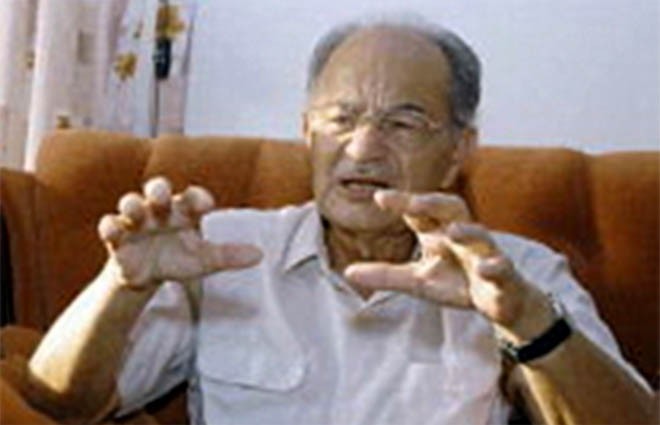
Not many Pakistanis knew about this inimitable singer of kheyal and teacher of classical music called Khalid Anwar

Very few people know about Khalid Anwar who passed away two weeks ago. He was as unassuming as one could get and lived his life peacefully, without creating the noise and rumble than was absolutely necessary.
Noise of course he could not stand since his whole preoccupation was with sound. For years, he sang the kheyal in his inimitable style stressing on the right combination of surs in a gradual development of the raag. He did not indulge in any kind of fireworks that has become a characteristic of the classical vocalists in the name of Punjab gaiki or the Punjab ang.
A Punjabi himself, he was the shagird of Feroz Nizami, another Punjabi but the music line that they both followed was that of Kirana. Over the years, the Kirana Gharana’s classical vocalist in the shape of the great Abdul Waheed Khan painfully built on the development of the raag through its tonal structure, based on a nuanced application of the sur.
For Ustad Abdul Waheed Khan, the real virtue of the kheyal gaiki was the systematic and gradual unfolding of the raag. He did that with such finesse that even the very initiated listeners would applaud his true understanding of the application of the shurtis.
He lived in Lahore for some time and inspired many a vocalist and instrumentalist with the purity of his intonation. Quintessentially, a vocalist of the vilampat lai, he knew that the actual gana was of lagao, the emotional content as released through the application of the right alankaras. This prevented him from indulging in speed, virtuosity for its own sake and excessive laikari through a rushed division and subdivision of the tempo.
Feroz Nizami too was a true follower and shagird of the gharana and he sang with the measured patience of a true gaik. At the same time, he was also known as a very good and successful composer of film music. His scholarly works on the theory of music too were greatly applauded. Writing both in Urdu and English, Feroz Nizami’s vast and catholic understanding and vision placed music in a bigger context.
His melodies were the rage of the industry. In colonial India, he hit real fame with the great score of Jugnu which brought out the real genius of Noor Jehan and led to Mohammed Rafi’s first popular success. In Pakistan, drawing upon a limited pool of talent and scarce resources, he scored brilliantly for Chunway and Dupatta.
Gradually, he took to teaching music and when the classes started at the Alhamra in the early 1960s, he began to tutor shagirds in the new methodology akin to taking tuitions. He taught successfully there with Ustad Sharif Khan on the sitar in an adjoining class, and the two represented the best of our traditional music in methodology and personality.
There, as he taught mostly the enthusiasts rather than the committed, he had able support in the person of Khalid Anwar, an assistant to the ustad and moulded in the same tradition of both music and personality. Feroz Nizami died in 1975 and Khalid Anwar lost a mentor and the reason of him staying back in the country.
After the 1970s, Khalid Anwar went away from Pakistan to the Middle East, mostly in Qatar and Oman, where he continued to nurture his passion for music. Initially, he sang to a group of Indian/Pakistani expatriates who had gone to the Middle East like him in search of gainful employment. Gradually, these avid listeners came to recognise his immense understanding, rigorous discipline and a systematic approach to music. Many opted to become his shagirds and he then worked for a living in the mornings and in the evenings, especially on weekends, held music classes for all those wanting to relive home in the Middle East.
His fame spread further and became part of the circuit that performed in various cities of the Middle Eat with a sizable number of people from the subcontinent. Whether it was Muscat or Dubai or Abu Dhabi, Khalid Anwar was in great demand and for more than three decades he performed and taught classical music to a set of dedicated students who were hard core professionals during the day and eager musicians in the evenings. They did not want to excel or become professional vocalists and instrumentalists but wanted to re-cultivate the essence of their own music in foreign lands on an amateur level.
Anwar was happy travelling back to Pakistan occasionally and giving an odd concert or two, just to remind the diminishing number of Pakistanis what they had lost in not retaining him as a teacher of classical music.
Since he was from a family of non-musicians, he had laboured to learn and then apply the same techniques to his teaching methods. Other than music, the other passion of Khalid Anwar was photography. A very shy laidback person, one had to enquire why he carried expensive professional cameras, only to be told reluctantly that his second passion was photography.
He held many exhibitions in the Middle East and was acknowledged as a very good photographer by even those claiming to be experts in the field. He only came back to Pakistan after retirement, and found himself out of step with a society where classical music had less listeners and where old world values were being replaced at supersonic speed.